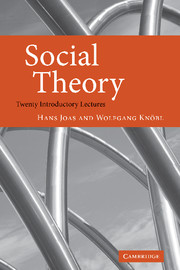Book contents
- Frontmatter
- Dedication
- Contents
- Introduction
- I What is theory?
- II The classical attempt at synthesis: Talcott Parsons
- III Parsons on the road to normativist functionalism
- IV Parsons and the elaboration of normativist functionalism
- V Neo-utilitarianism
- VI Interpretive approaches (1): symbolic interactionism
- VII Interpretive approaches (2): ethnomethodology
- VIII Conflict sociology and conflict theory
- IX Habermas and critical theory
- X Habermas' ‘theory of communicative action’
- XI Niklas Luhmann's radicalization of functionalism
- XII Anthony Giddens' theory of structuration and the new British sociology of power
- XIII The renewal of Parsonianism and modernization theory
- XIV Structuralism and poststructuralism
- XV Between structuralism and theory of practice: The cultural sociology of Pierre Bourdieu
- XVI French anti-structuralists (Cornelius Castoriadis, Alain Touraine and Paul Ricoeur)
- XVII Feminist social theories
- XVIII A crisis of modernity? New diagnoses (Ulrich Beck, Zygmunt Bauman, Robert Bellah, and the debate between liberals and communitarians)
- XIX Neo-pragmatism
- XX How things stand
- References
- Author index
- Subject index
XVI - French anti-structuralists (Cornelius Castoriadis, Alain Touraine and Paul Ricoeur)
Published online by Cambridge University Press: 05 June 2014
- Frontmatter
- Dedication
- Contents
- Introduction
- I What is theory?
- II The classical attempt at synthesis: Talcott Parsons
- III Parsons on the road to normativist functionalism
- IV Parsons and the elaboration of normativist functionalism
- V Neo-utilitarianism
- VI Interpretive approaches (1): symbolic interactionism
- VII Interpretive approaches (2): ethnomethodology
- VIII Conflict sociology and conflict theory
- IX Habermas and critical theory
- X Habermas' ‘theory of communicative action’
- XI Niklas Luhmann's radicalization of functionalism
- XII Anthony Giddens' theory of structuration and the new British sociology of power
- XIII The renewal of Parsonianism and modernization theory
- XIV Structuralism and poststructuralism
- XV Between structuralism and theory of practice: The cultural sociology of Pierre Bourdieu
- XVI French anti-structuralists (Cornelius Castoriadis, Alain Touraine and Paul Ricoeur)
- XVII Feminist social theories
- XVIII A crisis of modernity? New diagnoses (Ulrich Beck, Zygmunt Bauman, Robert Bellah, and the debate between liberals and communitarians)
- XIX Neo-pragmatism
- XX How things stand
- References
- Author index
- Subject index
Summary
As discussed in Lecture XIV, structuralism dominated French intellectual life from the 1950s on. The decline in the significance of ‘classical’ structuralism, which set in towards the end of the 1970s, did little to change this. For at least some of the so-called post- or neo-structuralist authors who rose so rapidly to prominence remained very much indebted to the legacy of structuralism. This made it tremendously difficult for non-structuralist humanities scholars and social scientists to make their voices heard within France, particularly because such a stance was generally criticized or even denounced as ‘subjectivism’. It is thus with some bitterness that the authors we are about to consider describe the period of structuralist hegemony. Cornelius Castoriadis, for instance, referred to a ‘linguistic epidemic’, which made clear thinking very difficult as a result of its ‘simplistic pseudo-model of language’ (Castoriadis, Crossroads in the Labyrinth, p. 120). The structuralists' ‘hegemony’ meant that certain nonstructuralist French thinkers were for a long time more influential outside of France than inside it, because their writings did not face such huge (structuralist) barriers to reception in other countries. This has begun to change only recently. French intellectuals are now ready to acknowledge the significance of anti-structuralist thinkers (see also Lecture XX).
- Type
- Chapter
- Information
- Social TheoryTwenty Introductory Lectures, pp. 401 - 431Publisher: Cambridge University PressPrint publication year: 2009

